Search results
11 results found.
11 results found.

A new issue of the Dust Magazine is out! (you might remember I hailed the Dust Magazine last time it came out) And this time, yours truly is a contributor!
Other GhanaBlogging

members contributing to this issue are Esi Cleland/What your momma never told you about business, Nana Darkoa Sekyiamah /Adventures from the bedrooms of African women and of course Kobby Graham is the editor of Dust Magazine.
The issue also has a beautiful cover photo of Ghanaian musician Ebo Taylor by Tobias Freytag/FAD and several amazing photo collages by facebook celeb Adisa Abeba (a Tema resident like myself!) – all in all, both pictures and texts well worth your time.
Of course, this time around I am slightly biased…
 I hope you have come across the new issue of Ghana’s best free magazine, Dust. “It’s everywhere” is their clever slogan (but now I can’t find it on the mag – did I dream it?) and it is true as you can pick it up in different places, but also read it online: Dust December Issue 2010.
I hope you have come across the new issue of Ghana’s best free magazine, Dust. “It’s everywhere” is their clever slogan (but now I can’t find it on the mag – did I dream it?) and it is true as you can pick it up in different places, but also read it online: Dust December Issue 2010.
The magazine is the brainchild of my friend Chrystal and a bunch of Ghanabloggers are involved: Kobby Graham as editor, Nana Darkoa Sekyiamah as a returning contributor and Esi Cleland as this issue’s featured blogger!
Read it to get a glimpse of the cool, cultural, urban Ghana that also exists along the more traditional images of my home country.

It is getting late. The year is almost ending. The time has come for bloggers to summarize the year. We all do it differently; I enjoyed MsAfropolitan’s love letter, the book lists that hyper-readers Accra Books and things and A Fork in the Road shared and Africa Is A Country’s West African club hits!
My summary of the blogging year 2011 might not be possible to dance to, still here it is:
The year started out on a strong note. In January, I learned about Free and Open Source Software for Academics and analysed the Ghanaian “happiness culture“.
During February, I realized in Swedish media Ghana is often portrayed like a success, economically, democratically and technologically. A more recent text buttressing my point is the top African success stories 2011 at Connected Africa. This month I also celebrated my 30th birthday and my 500th blog post!
In March, I was inspired by DUST magazine and wrote my own You Know You Are In Accra When – jokes.
April was the month I got more serious and wrote about the mental health crisis in Ghana, sexual harassment and the unrest in Ivory Coast.
On Mother’s day I announced I was becoming a mother myself. At that point in May, my belly was so big everyone who saw me IRL knew. It was not like you needed to be an investigative journalist… really is there just one investigative journalist in Ghana?
In June, I left Ghana for Europe. First stop was Marseille. Then it was time for debating homosexuality. A debate that also made it to Global Voices.
In July, our daughter was born. What an experience! What a miracle! What a sweet soul!
In August, she was Virtually Outdoored. So was the Ashesi Berekuso Campus.
In September and October I was spending every hour of the day with our baby in Sweden. Taking walks, breastfeeding and blogging only sporadically.
Second week of November, I returned south and my daughter saw the green leaves and red soil of Ghana for the first time. And the green hoopoe!
In December, we had no water and I wrote about the EU Blue Card. And that was my 2011 year of blogging!
I am sure in the days to come, we will see many more chronicles of 2011 at Ghanablogging.com (soon to change name to BloggingGhana, but that is a story for 2012!)
Gott Nytt År! Afehyia pa! Happy New Year!
A celebrated part of new Dust magazine (that has been mentioned a number of times on this blog already) is the section called “you know you are in Accra when…” Basically a list of fun stuff that we can see daily and only become funny when highlighted. I have observed, similar things have been posted on Twitter with the hashtag “onlyinGhana”.
Anyhow, I have some to share with you:
You know you are in Accra when…/Only in Ghana…
…an envelope can double as a bag to carry about town.
… A meal costs anywhere between 70 pesewas and 70 GHC.
…you hear “I’m coming, eh!” when someone walks away from you.
…parking is free, but throwing your trash, going to the washroom or drinking cholera free water has a steep price.
…you have to run to cross the street, even if the “green man” is giving you way.
These are just some I thought of when driving to work the other day – do let me know your homemade ones as well in the comment section below!
 I have been asked to be the “offical blogger” for this weekend’s upcoming event, Bless the Mic Arts and Music Festival.I am very excited about this event which I believe will be rocking! I especially like the combo of visual arts and music.
I have been asked to be the “offical blogger” for this weekend’s upcoming event, Bless the Mic Arts and Music Festival.I am very excited about this event which I believe will be rocking! I especially like the combo of visual arts and music.
From the Press Release:
BLESS THE MIC ARTS & MUSIC FESTIVAL: ACCRA’S MOST EXCITING CULTURAL SEASON
Mi Prime Entertainment in collaboration with Alliance Francaise is pleased to announce this year’s ‘Bless the Mic Arts & Music Festival’, which takes place from the 27th – 29th of May 2010. ‘Bless the Mic Arts & Music Festival’ celebrates the diversity of Ghanaian creativity in the Arts and Music.
ABOUT BLESS THE MIC ARTS & MUSIC FESTIVAL
Bless the Mic Arts & Music Festival is organised by Mi Prime Entertainment in association with Alliance Francaise and supported by the Foundation for Contemporary Arts, MAKSI, Pidgen Music, Ghana Cultural Fund and 2131 Banging Hiphop show.
Media Partners: Y fm, X fm, myjoyonline and ghanamusic.com
Media Sponsors: E-TV Ghana, Net2 TV, CRTV, Ameyawdebra.com, Sky Digital Network, africanmp3s.com, chilloutghana and Dust Magazine.
The main event is happening this Saturday the 29th of May from 3pm -10pm at Alliance Francaise and will include a photo/art exhibition as well as poetry and live stage performances by King Ayisoba, Nana Fynn, Gouda Traditional Music, DK Osei Yaw, Yaw Kontoh, Chuks, Chase, Crystal Tettey, Fiifi Sellah and Efya.
Find more info on Facebook under “All Day Festival”. I will be blogging from the event.
See you there?
 On Saturday May 15th, the time has finally come for this creative, fresh and rocking musical movie, Coz ov Moni, to open to the world! Directed by King Luu and produced by Panji Anoff of Pidgen Music. It is featuring musicians Wanlov – the Kubolor and M3nsa (together they form the FOKN Bois), but also poet Mutumbo and legend Reggie Rockstone as well as other Ghana celebs!
On Saturday May 15th, the time has finally come for this creative, fresh and rocking musical movie, Coz ov Moni, to open to the world! Directed by King Luu and produced by Panji Anoff of Pidgen Music. It is featuring musicians Wanlov – the Kubolor and M3nsa (together they form the FOKN Bois), but also poet Mutumbo and legend Reggie Rockstone as well as other Ghana celebs!
This is the plot:
On a normal morning in Gbese, Accra. The FOKN Bois wake up and plan to go clubbing with some lady friends after chasing an evasive debtor for their money. Their free-spirited and seemingly conceited attitude makes them a few enemies as the day progresses. How will this day end for the FOKN Bois? Do they deserve what awaits them at the end of it all? Come find out!
Do you remember the funky Coz ov Moni trailer I posted some time ago? For the premiere, think that x 20!
DATE: Saturday, May 15th
VENUE: National Theatre
TIME: 6.30pm & 8.30pm (Two screenings)
TICKETS: 10 Ghc
This is going to be so great! Why? Coz of Moni! See you there!
Read more about the premiere at Ameyaw Debrah, Museke, African Hip Hop , Ghana Celebrities and fellow blogger MacJordan. Also read the lovely interviews in Dust Magazine with Kubolor and M3nsa.
Here are the Twitter highlights from four days of all things Ghana!





































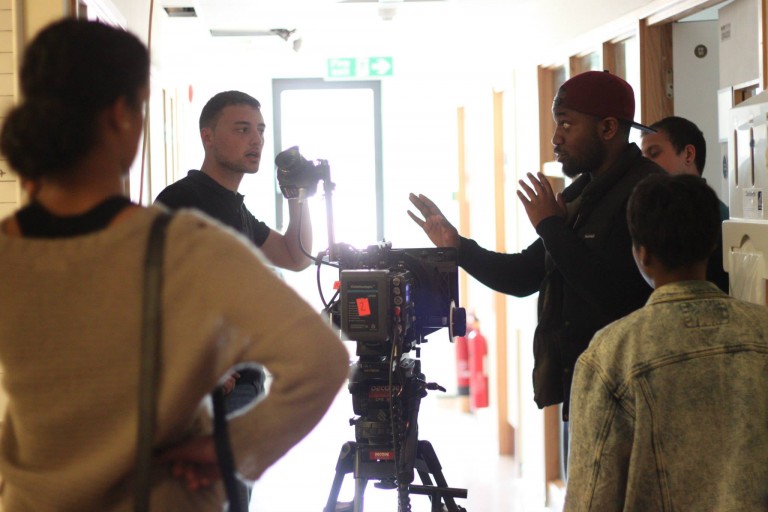
I recently linked up with Ghanaian filmmaker Koby Adom to learn more about his new project, House Girl, a short film dedicated to telling the story of the plight of young domestic workers in Ghana. I think we do not discuss the topic at all enough in Ghana and hence silently agree to, at times, terrible conditions for our country women.
When did you decide to make a film about house girls and why?
My mother and I are always having very long conversations about our life experiences and she is very open with me. A few years ago, she shared a story with me of when she witnessed the brutality inflicted on a house girl over a period of time while still living in Ghana in her younger years. It was happening in one of her friend’s houses by her friend’s mother. Being very articulate, my mum’s very detailed description of the events started sparking clear images of what it would be like in my head. These thoughts were chilling and gave me goosebumps and I wondered if any such thing would happen in contemporary Ghana so I researched it.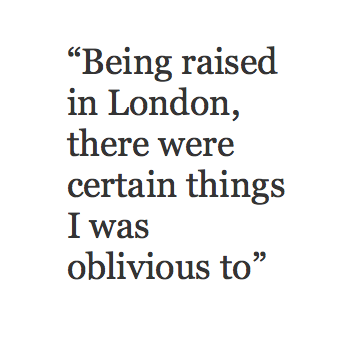
I have always remembered the story till this day and I went back to ask my mother more questions on occasion because it was hard to wrap my head around it. Being raised in London, there were certain things I was oblivious to so parts of the story just didn’t add up or make sense to me.
So when the end of my film school education was approaching, I decided to explore this story further for my graduation film. I was also very out of touch with Ghana and wanted to be reconnected with it so this was the perfect opportunity to explore that too; through film.
What is known about the issue? What is yet to be documented?
Having lived in Accra for just over a year when I was a child (1996-1998), I remember house girls/ house boys as the norm. However, my perception of that role in the house hold was positive because of the person who helped my family back then. She was like my older sister or a cool young aunty who helped out. My mum treated her like she would treat my siblings and I, but with a lot more respect – My mum still speaks very fondly of her now calling her ‘an angel’ because she took a lot of pressure off my mum’s shoulders at a time when it was most needed.
Furthermore, I visited Ghana in August 2015 and stayed 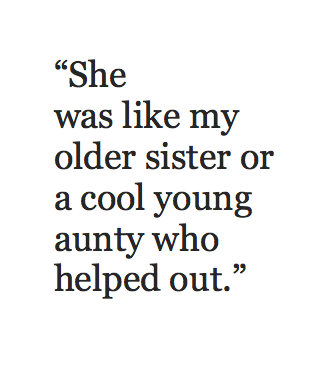 with family I have in Accra. My family members treated their domestic workers with total respect, so I was still in the dark as to what would cause anybody to treat a human being like that. So I did some research on it to find out if such brutalities still happen in Ghana and was pretty upset with what I found: an article by Kwaku Adu-Gyamfi on www.modernghana.com entitled ‘Corpses Have More Respect Than House Maids’. This was a Ghanaian website, speaking about Ghana. It wasn’t an outside perspective. Adu-Gyamfi also mentions it is an issue which is hardly talked about, because of the cultural history behind it. That is one of the reasons why I decided to write a script about house girls; To shine light on a situation which can spark a conversation so action can be taken to reduce, if not eradicate such practices in Ghana and Africa as a whole.
with family I have in Accra. My family members treated their domestic workers with total respect, so I was still in the dark as to what would cause anybody to treat a human being like that. So I did some research on it to find out if such brutalities still happen in Ghana and was pretty upset with what I found: an article by Kwaku Adu-Gyamfi on www.modernghana.com entitled ‘Corpses Have More Respect Than House Maids’. This was a Ghanaian website, speaking about Ghana. It wasn’t an outside perspective. Adu-Gyamfi also mentions it is an issue which is hardly talked about, because of the cultural history behind it. That is one of the reasons why I decided to write a script about house girls; To shine light on a situation which can spark a conversation so action can be taken to reduce, if not eradicate such practices in Ghana and Africa as a whole.
Adu-Gyamfi’s article was bold, but I believe there should be a lot more Ghanaian media outlets starting the conversation about the issue. By taking responsibility of the problem, African countries can avoid negative perceptions from abroad, which also prevents outsiders coming in to try and solve the problem.
What is your goal with the film, what do you hope to achieve?
I have two main goals with this film: Firstly, I want to make a fantastic film about something serious to further my career as a filmmaker. At this stage of our careers, young student filmmakers don’t usually make short films to sell or make money. At this stage we are focused on finding an audience for our art to further our careers. The best thing about the London Film School is that we are taught very rigidly how to make films in a tough but effective two-year Masters program. As a result, we come out the other end knowing how to make films without thinking too much about it. This now gives us the opportunity to focus on our art and craft. Adding magical things to a film which we figure out ourselves. I am using this film to tell a story which needs to be told in a magical way do get my point across – We aim to enter this film into film festivals globally to get a wide audience for it and eventually release it online for even more people to see.
Secondly, I want people in the western world to know more about Ghana and how far it has come as a nation. In the same breath I want Ghanaians to know that there are issues that still need to be resolved internally and I want to encourage them to do so. I want this film to show Ghana in all it’s glory but also show everybody one area which needs fixing; focusing more on human rights for everybody within it’s borders. Whether it is in established cities like Accra or villages outside of the major cities.
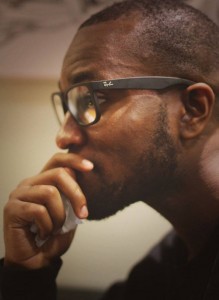 How do you make sure you: an educated male living abroad gets it right?
How do you make sure you: an educated male living abroad gets it right?
I am so happy you asked me this question because I worried about this for a long time. However, like I said I asked my mother a lot of questions as well as my family who live in Accra. They have all been very helpful in helping me shape the narrative of this story from a cultural stand point.
Also my personal tutor at film school put me in touch with Erik Knudsen, an experienced Danish-Ghanaian filmmaker who had previously made films in Ghana. He was very easy to speak to and was in a similar position to myself; being Ghanaian by parentage but could still be considered an outsider. Erik read one of the drafts of my script and helped me to think further into the culture of Ghana. He advised me to visit Ghana and learn how things work for myself rather than rely on the memory I have of it from 1998 and stories from others which weren’t my own experiences. This was fantastic advice, because I could really take in the spirit of the nation by going there.
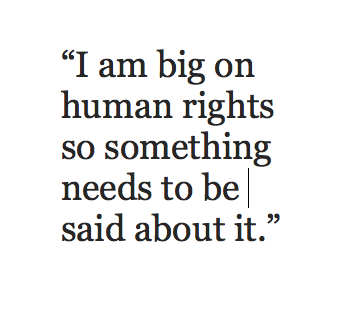 I also speak to my peers in the UK who also have African heritage (There are loads of us! Especially in London). We are all in the same position in terms of our knowledge of our respective motherland. One friend in particular, who is an actress shared an account of when her parents flew over a domestic worker from Nigeria to London and the brutalities happened here! I knew this existed, but I was horrified that people so close to me had actually seen and been through what my mother had told me. That is what really cemented my desire to make a film on this topic. I am big on human rights so something needs to be said about it.
I also speak to my peers in the UK who also have African heritage (There are loads of us! Especially in London). We are all in the same position in terms of our knowledge of our respective motherland. One friend in particular, who is an actress shared an account of when her parents flew over a domestic worker from Nigeria to London and the brutalities happened here! I knew this existed, but I was horrified that people so close to me had actually seen and been through what my mother had told me. That is what really cemented my desire to make a film on this topic. I am big on human rights so something needs to be said about it.
I’m imagining filmmaking to be incredibly hard, tedious and expensive. Tell us of a moment in your filmmaking career that made it all worth it.
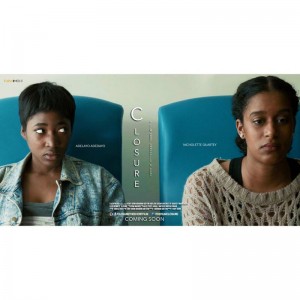 While making my last short film ‘Closure’, I experienced the hardships that you mentioned. I didn’t sleep much because of everything that needed to be done. Once the film was financed, made and screened, I felt a great sense of pride from everything that came from it. I sent the film to a load of industry contacts and film magazines/ bloggers and the response was over-whelming. I got some good feed back from executives at big production and distribution companies like Lionsgate, Sky Movies, Warner Brothers and TWC. I also featured in an article on Indiewire, which is a huge online independent film magazine. This got me a lot of important contacts in this industry.
While making my last short film ‘Closure’, I experienced the hardships that you mentioned. I didn’t sleep much because of everything that needed to be done. Once the film was financed, made and screened, I felt a great sense of pride from everything that came from it. I sent the film to a load of industry contacts and film magazines/ bloggers and the response was over-whelming. I got some good feed back from executives at big production and distribution companies like Lionsgate, Sky Movies, Warner Brothers and TWC. I also featured in an article on Indiewire, which is a huge online independent film magazine. This got me a lot of important contacts in this industry.
I also held a private screening for this film and over 350 people turned up to watch it and listen to our question and answer session. After all the hard work, it is great to know that people have appreciated your efforts and that people were affected/ influenced by the film. There is no better feeling than that and it makes all the hard work and challenges faced worth it.
Furthermore, I made a short documentary called ‘Deborah’s Letter’, which is about my little sister who was born with Spina Bifida and is in a wheel chair as a result. The film won the audience favourite award at the Cinema Touching Disability Film Festival in Austin, Texas. I also received a lovely message from the festival director that the film touched the entire audience. These are the moments filmmakers live for. To know that we have put something from our head to the screen and it has had an impact on others. It is an amazing feeling.
Finally, any word of advise for young creatives?
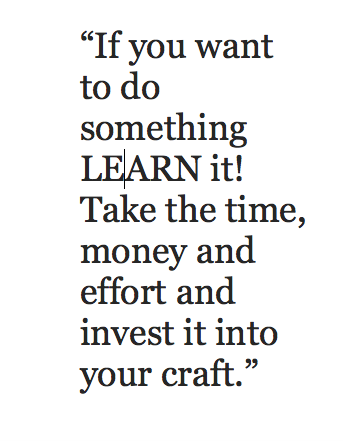 If you want to do something LEARN it! Take the time, money and effort and invest it into your craft. Be patient. A lot of people want instant gratification and I was one of them. I have learnt that working hard and learning the industry and the craft will take me so much further than if I went diving head first with no knowledge. Nothing wrong with diving but don’t do it with no idea of what you are about to fall into. Knowledge is power.
If you want to do something LEARN it! Take the time, money and effort and invest it into your craft. Be patient. A lot of people want instant gratification and I was one of them. I have learnt that working hard and learning the industry and the craft will take me so much further than if I went diving head first with no knowledge. Nothing wrong with diving but don’t do it with no idea of what you are about to fall into. Knowledge is power.
Secondly, just be bold. Don’t be discouraged to do something because nobody has done it before. The way I see it, that thing hasn’t been done before because God has left it vacant for YOU. Everybody who is important in the world today did something that logic would have discouraged. Listen to people but you don’t have to follow them. Listen to why they say you shouldn’t do it and use it as research to figure how you are going to do it. BE BOLD!
You can support the HouseGirl film on KickStarter and follow it of Facebook and Twitter for updates.
The world’s first musical movie in Ghanaian pidgen or slang English is soon coming to a screen near you. To start with, you get a glimpse of it here!
The theme “Coz ov moni” is smack on post-economic crisis in Ghana. Everything is because of money.
The singing stars of the movie Wanlov and M3nsa are already stars in Ghana. In the new Dust Magazine, both of them are interviewed. Wanlov, known as “the Kubolor” here in Ghana was asked if he is more known outside of Ghana – this is what he answered:
No, I walk through Holland, Copenhagen and once or twice everyday someone will recognise me and say, “You’re Wanlov, right?” Whereas over here, once every thirteen minutes or so, someone will shout, “Ei Kubolor!”
Haha, I think I might be guilty of one or two shout-outs like that. Read the full quirky interview here.
To me, the funky songs totally blends in with the almost rhytmical filming (think music video) to the extent that I’m thinking, “can this really be the first pidgen musical? It just fits so well!”
Must say I also love the scenography which I am guessing is all about finding the perfect real life setting and adding lights – nothing beats reality! Really, Accra’s backyards with its half dressed people and stuffy Internet cafés have never before looked so good!
The producer/director (I haven’t really done my homework here and I think it might be too early in the day to call him) is famous music producer Panji Anoff. UPDATE: The director is King Luu.
All in all, this movie can only be a hit. Can’t wait too see it!
(Yes, dear readers, I’ll put the details up here as soon as I have them!)
>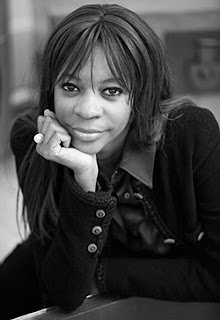 Surfed into Guernica Magazine ( a wonderful web based magazine on art and politics!) and saw this interview with writer and economist Dembisa Moyo.
Surfed into Guernica Magazine ( a wonderful web based magazine on art and politics!) and saw this interview with writer and economist Dembisa Moyo.
Moyo has recently written a book, “Dead Aid”. Her agument is that aid dependence is doing more to hurt than to help Africa. And that aid is being sustained not because there is evidence of progress, but because of the 500 000 people who work in the “aid industry”.
At the same time African governments are not taxing their people and hence people also expect little of them. Opaquness rather than transparancy, corruption rather than efficiencly describes governance in Africa.
Some people, like her teacher at Oxford and Harvard
Paul Collier, feel she is mostly correct and that her wishes of slashed aid will come true because of the current economic downturn.
Others like writer Madeleine Bunting thinks Moyo’s liberalist views are poorly underpinned and wonders what will happen to the poorest people, like the HIV infected, if aid is terminated.
The other day I met a fellow who works with the Millenium Challenge initiative to build roads and make agriculture more efficient in Ghana. A project costing USD 547 million. Some of the projcts he described, like facilitating the supply of vegetables to Accra and the harbor in Tema, is something I have never heard the Ghanaian government(s) suggest.
Then the question is why, is it because someone else is already doing it?
> An inspiring person, just one, can change your whole outlook on life. When you see someone talk with that sparkle in their eye, work hard and deliver the most amazing outcomes and move around life as if the situation was custom made for him or her – then I want to do the same. My interest in my surroundings, work morale and heck – even joy of being alive – gets a boost.
Some inspiring people that has crossed my lucky path recently here in Ghana are June Arunga, a young Kenyan woman who works in the IT industry here in Ghana, gives globalization speeches and have traveled the continent in the TV program The Devil’s Footpath. She is fast and fun and a person I am just getting to know (including her inspiring book shelf, thanks June!).
Michael Boampong is youth activist and founder of the NGO Young People We Care and one of the 40 most active in Taking IT Global, an online community which seeks to inspire, involve and inform young people. I have not had the opportunity to meet with him yet, but through Internet I know of him and maybe he soon knows of me as well! (all this also inspiring, isn’t it?)
I sat down with Nii Mantse just last week who is the editor of Jive, a magazine covering entertainment in Ghana. He has also worked in TV production, for instance with Studio 53 which covers Africas 53 nations, but also with Ghanaian television. We spoke about what matters at work, what young people like to do in Accra and an hour flew by.
All these three people have that energy/drive/sparkle in their eye that inspires me.
Migration Research Update: June has also done a documentary on why the educated youth leaves the continent called “Africa’s Ultimate Resource” and Michel wants to be a “migration expert” in the future. I think I need to talk to both of them in preparation for my upcoming migration studies.
In the pic the Ghanaian fertility symbol Akuaba to illustrate the mind fertilization and inspiration in this post.